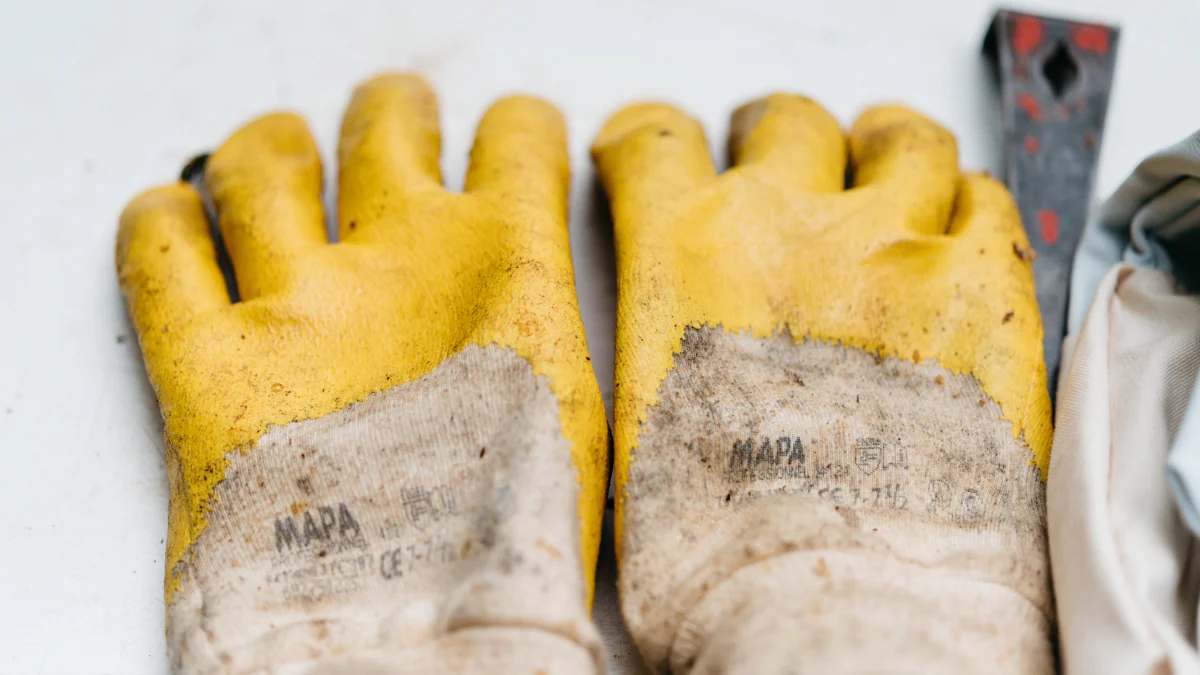Choosing the right type of gloves for various applications holds significant importance. Gloves serve as a crucial barrier against contaminants, ensuring safety and hygiene across multiple industries. The focus here lies on Nitrile coated gloves and latex coated gloves. Understanding the differences between these materials can guide better decisions in glove selection. The global Industrial Gloves market, valued at USD 9895.46 million in 2022, underscores the critical role of gloves in various sectors. Millions of nitrile gloves are disposed of each year, emphasizing the need for informed choices. For those seeking superior protection, consider adding Add to cart options for nitrile gloves.
Material Composition

Nitrile Coated Gloves
Synthetic Rubber Origin
Nitrile Coated Gloves originate from synthetic rubber, specifically nitrile rubber. This material includes a blend of nitrile butadiene rubber (NBR) and other additives. These additives enhance the strength and elasticity of the gloves. Nitrile gloves and latex gloves differ significantly in their origins, with nitrile being a man-made alternative.
Chemical Resistance
Nitrile Coated Gloves exhibit superior chemical resistance. This makes these gloves ideal for handling hazardous substances. Nitrile gloves protect against a wide range of chemicals, including oils, acids, and solvents. This property ensures minimal cross-contamination in various settings.
Durability
Nitrile Coated Gloves are known for their durability. These gloves offer three times more puncture resistance than latex gloves. The long shelf life of nitrile gloves makes them a reliable choice for industries requiring robust protection. Nitrile gloves prove to be highly efficient in lab settings due to their durability.
Latex Coated Gloves
Natural Rubber Origin
Latex Coated Gloves come from natural rubber. This material provides a comfortable fit and excellent protection against viruses and bacteria. Latex gloves offer a natural alternative to synthetic options like nitrile.
Elasticity and Comfort
Latex Coated Gloves provide superior elasticity and comfort. These gloves fit snugly on the hands, allowing for better dexterity. Latex gloves offer a high level of tactile sensitivity, making them suitable for tasks requiring precision.
Biodegradability
Latex Coated Gloves are biodegradable. This characteristic makes these gloves an environmentally friendly option. Latex gloves decompose naturally, reducing environmental impact compared to synthetic alternatives.
Characteristics
Nitrile Coated Gloves
Puncture Resistance
Nitrile coated gloves offer exceptional puncture resistance. This feature makes nitrile gloves a preferred choice in industries where sharp objects are common. For instance, Dre Health nitrile exam gloves provide above-average puncture and cut resistance. This ensures that workers remain protected from potential injuries.
Hypoallergenic Properties
Nitrile coated gloves are hypoallergenic. These gloves do not contain natural rubber proteins, which can cause allergic reactions. Allergies play a huge role in selecting the right type of glove. Nitrile gloves offer a safer alternative for individuals with latex allergies.
Texture and Grip
Nitrile coated gloves feature a textured surface. This texture enhances grip, making nitrile gloves suitable for handling small or slippery objects. The NP016 Anti-Cut Nitrile Grip Work Gloves, for example, provide excellent grip and durability. This ensures that users can perform tasks with precision and confidence.
Latex Coated Gloves
Flexibility and Dexterity
Latex coated gloves excel in flexibility and dexterity. These gloves fit snugly on the hands, allowing for a high level of tactile sensitivity. This makes latex gloves ideal for tasks requiring fine motor skills. Powder-free latex gloves, for instance, are form-fitting and nonrestrictive, providing comfort and ease of movement.
Sensitivity to Allergies
Latex coated gloves can cause allergic reactions in some individuals. Natural rubber proteins in latex can trigger allergies. This sensitivity limits the use of latex gloves for those with known allergies. Therefore, understanding the difference between nitrile and latex gloves is crucial for safety.
Texture and Grip
Latex coated gloves also offer a textured surface. This texture provides a secure grip, similar to nitrile gloves. However, the grip and texture may vary based on the specific brand and type of latex glove. Wostar multi-purpose latex gloves, for example, are thin and comfortable with good tactile sensitivity, ensuring effective performance in various tasks.
Applications

Nitrile Coated Gloves
Medical and Healthcare
Nitrile Coated Gloves serve as an essential barrier in medical and healthcare settings. These gloves provide superior protection against bloodborne pathogens and other contaminants. The chemical resistance of nitrile gloves makes them ideal for handling various medical substances. Healthcare professionals prefer nitrile gloves due to their durability and hypoallergenic properties. Exam Powder-Free Gloves made from nitrile ensure safety and hygiene during medical procedures.
Industrial and Chemical Handling
Industries that involve chemical handling rely heavily on nitrile Coated Work Gloves. These gloves offer exceptional chemical resistance, protecting workers from harmful substances. Nitrile gloves withstand exposure to oils, acids, and solvents, making them suitable for industrial applications. Workers in manufacturing and chemical plants benefit from the puncture resistance of nitrile gloves. Cut Resistant Nitrile Coated gloves provide additional protection in environments with sharp objects.
Food Processing
The food processing industry demands high levels of hygiene and safety. Nitrile Coated gloves meet these requirements by offering chemical resistance and preventing cross-contamination. Food handlers use nitrile gloves to maintain cleanliness and protect against foodborne illnesses. The durability of nitrile gloves ensures long-lasting use in food processing environments. Disposable Mechanics Gloves made from nitrile also find applications in food-related tasks.
Latex Coated Gloves
Medical and Dental
Latex Coated gloves remain a popular choice in medical and dental fields. These gloves provide excellent protection against viruses and bacteria. The elasticity of latex gloves allows for a snug fit, enhancing dexterity during medical procedures. Dentists and surgeons prefer latex gloves for their tactile sensitivity. Exam Powder-Free Gloves made from latex ensure comfort and precision in medical tasks.
Household and Cleaning
Household and cleaning tasks benefit from the use of latex coated gloves. These gloves offer flexibility and comfort, making them suitable for prolonged use. Latex gloves protect hands from cleaning chemicals and detergents. The biodegradability of latex gloves makes them an environmentally friendly option for household chores. Hot Glove Heat Resistant gloves made from latex provide additional protection when handling hot items.
General Purpose
Latex Coated gloves serve various general-purpose applications. These gloves offer a balance of protection and comfort for everyday tasks. Latex gloves find use in gardening, painting, and other DIY activities. The texture and grip of latex gloves enhance performance in different tasks. Hot Glove Heat Resistant Gloves made from latex ensure safety when dealing with heat-related activities.
Benefits and Drawbacks
Nitrile Coated Gloves
Advantages
Nitrile coated gloves offer several key advantages. These gloves provide superior puncture resistance, making them ideal for environments with sharp objects. The synthetic rubber material in nitrile gloves ensures excellent chemical resistance. This feature makes nitrile gloves suitable for handling hazardous substances. Nitrile gloves also exhibit hypoallergenic properties. These gloves do not contain natural rubber proteins, which can cause allergic reactions. The durability of nitrile gloves ensures a long shelf life, providing reliable protection over time.
Disadvantages
Despite their advantages, nitrile coated gloves have some drawbacks. These gloves tend to be less flexible than latex gloves, which can impede range of motion. The production cost of nitrile gloves is higher compared to latex gloves. This factor can make nitrile gloves a less cost-effective option for some users. Additionally, nitrile gloves are not biodegradable. This characteristic raises environmental concerns, as these gloves contribute to landfill waste.
Latex Coated Gloves
Advantages
Latex coated gloves offer several notable benefits. These gloves provide excellent elasticity and comfort, fitting snugly on the hands. The natural rubber material in latex gloves ensures high tactile sensitivity. This feature makes latex gloves ideal for tasks requiring precision. Latex gloves also offer effective protection against viruses and bacteria. The biodegradability of latex gloves makes them an environmentally friendly choice. These gloves decompose naturally, reducing their impact on the environment.
Disadvantages
However, latex coated gloves have some disadvantages. The natural rubber proteins in latex can cause allergic reactions in some individuals. This sensitivity limits the use of latex gloves for those with known allergies. Latex gloves also provide less chemical resistance compared to nitrile gloves. This limitation makes latex gloves less suitable for handling hazardous substances. Additionally, latex gloves are less durable than nitrile gloves, offering lower puncture resistance.
Industry-Specific Recommendations
Healthcare Industry
Preferred Glove Type
Healthcare professionals often prefer Nitrile coated gloves. These gloves offer superior puncture resistance and hypoallergenic properties. Nitrile gloves protect against bloodborne pathogens and other contaminants. The durability of Nitrile gloves ensures long-lasting use in medical settings.
Safety Standards
Healthcare settings require adherence to strict safety standards. Nitrile gloves meet these standards by providing excellent chemical resistance. Medical professionals must ensure that gloves comply with FDA regulations. Proper disposal methods for Nitrile gloves maintain hygiene and safety.
Industrial Sector
Preferred Glove Type
The industrial sector often relies on Nitrile coated gloves. These gloves withstand exposure to oils, acids, and solvents. Workers benefit from the puncture resistance of Nitrile gloves. Industries such as automotive and chemical handling prefer Nitrile for its durability.
Safety Standards
Industrial safety standards emphasize protection against hazardous substances. Nitrile gloves meet these requirements by offering superior chemical resistance. Workers must follow OSHA guidelines for glove use. Proper training on glove selection and usage ensures worker safety.
Food Industry
Preferred Glove Type
The food industry often uses Nitrile coated gloves. These gloves prevent cross-contamination and maintain hygiene. Food handlers benefit from the chemical resistance of Nitrile gloves. The durability of Nitrile gloves ensures long-lasting use in food processing environments.
Safety Standards
Food safety standards require the use of gloves that prevent contamination. Nitrile gloves meet these standards by providing excellent chemical resistance. Food handlers must ensure that gloves comply with FDA regulations. Proper disposal methods for Nitrile gloves maintain cleanliness and safety.
The comparison between Nitrile and Latex coated gloves highlights key differences in material composition, characteristics, and applications. Nitrile gloves offer superior puncture resistance and chemical resistance, making them ideal for industrial and medical settings. Latex gloves provide excellent elasticity and comfort, suitable for tasks requiring precision.
Choosing the right type of gloves based on specific needs ensures safety and effectiveness. Consider both the benefits and drawbacks of each type. Nitrile gloves excel in durability and hypoallergenic properties, while Latex gloves offer biodegradability and tactile sensitivity.
For industries requiring robust protection, Nitrile gloves are recommended. For tasks needing flexibility and comfort, Latex gloves are preferable. Always consider the specific requirements of the application to make an informed decision.










